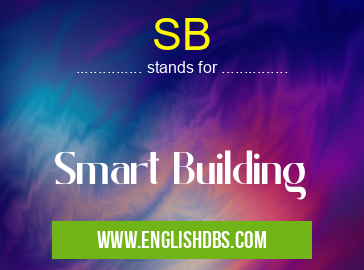What does SB mean in ARCHITECTURE
Smart Building (SB) is a building that utilizes integrated digital technologies to enhance its operational efficiency, comfort, and sustainability. These technologies allow for automation, monitoring, and control of various building systems, leading to improved performance and reduced operating costs.

SB meaning in Architecture in Academic & Science
SB mostly used in an acronym Architecture in Category Academic & Science that means Smart Building
Shorthand: SB,
Full Form: Smart Building
For more information of "Smart Building", see the section below.
Key Features of SBs
- Integrated Building Management Systems (BMS): Centralized platforms that integrate and control different building systems, such as HVAC, lighting, security, and access control.
- Sensors and IoT (Internet of Things): Devices that collect real-time data on building conditions, occupants, and energy consumption.
- Data Analytics and Artificial Intelligence (AI): Used to analyze collected data, identify patterns, and make informed decisions to optimize building operations.
- Cloud Computing: Enables remote access and storage of building data, facilitating collaboration and data-driven decision-making.
- Occupant-Centric Design: Focuses on enhancing the comfort, productivity, and well-being of building occupants.
Benefits of SBs
- Improved Energy Efficiency: Automated HVAC and lighting systems reduce energy waste and lower operating costs.
- Enhanced Comfort: Sensors monitor temperature, humidity, and air quality to create optimal indoor environments.
- Increased Safety and Security: Integrated access control and surveillance systems improve building security and safety.
- Reduced Maintenance Costs: Predictive maintenance and remote monitoring minimize the need for costly repairs.
- Sustainability: SBs promote environmental sustainability by reducing energy consumption and optimizing resource usage.
Essential Questions and Answers on Smart Building in "SCIENCE»ARCHITECTURE"
What is a Smart Building (SB)?
A Smart Building (SB) incorporates advanced technology to enhance the efficiency, comfort, and sustainability of a building. It integrates systems such as lighting, HVAC, and security to optimize building operations and provide real-time data for improved decision-making.
What are the benefits of Smart Buildings (SB)?
SBs offer numerous benefits, including:
- Increased energy efficiency and reduced operating costs
- Improved occupant comfort and productivity
- Enhanced building security and safety
- Data-driven decision-making for better management
- Reduced environmental impact and increased sustainability
What technologies are used in Smart Buildings (SB)?
SBs utilize various technologies, such as:
- Sensors and IoT devices to collect data on building conditions
- Building automation systems to control and optimize operations
- Energy management systems to monitor and reduce energy consumption
- Security systems for access control, surveillance, and threat detection
- Cloud platforms for data storage, analysis, and visualization
How do Smart Buildings (SB) improve occupant experience?
SBs enhance occupant experience through:
- Personalized lighting and temperature control for comfort and productivity
- Real-time information on building conditions for improved awareness
- Mobile apps for convenient building access, room booking, and service requests
- Indoor air quality monitoring for health and well-being
How do Smart Buildings (SB) contribute to sustainability?
SBs promote sustainability by:
- Optimizing energy consumption to reduce carbon emissions
- Monitoring water usage and implementing efficient fixtures
- Utilizing renewable energy sources
- Providing data-driven insights for sustainable practices
Final Words: Smart Buildings represent a technological revolution in building design and management. By integrating digital technologies, they offer significant benefits in terms of energy efficiency, comfort, safety, and sustainability. As the demand for intelligent and connected buildings grows, SBs are poised to play a crucial role in shaping the future of the built environment.
SB also stands for: |
|
| All stands for SB |
